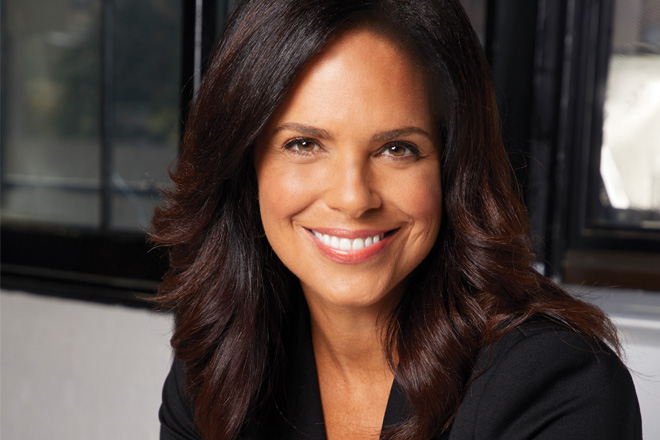Interview by Cecily Garber
Soledad O’Brien is a reporter, editor and host of the Sunday morning syndicated political show “Matter of Fact with Soledad O’Brien.” O’Brien brings a fresh perspective on diverse contemporary issues to foster change. She gave voice to the underserved and disenfranchised through her Emmy-winning reporting and acclaimed documentary series, “Black in America” and “Latino in America.” Formerly a CNN anchor and contributing editor for “PBS News Hour,” she is founder and CEO of Starfish Media Group and a prominent philanthropist. She is the keynote speaker of the 2020 NBOA Annual Meeting, February 23-26, in Orlando, Florida.
Net Assets: Good journalism isn’t cheap — it costs more to send reporters into the field than to pay a commentator on a set, for example. And yet news outlets run on tight budgets. Independent schools also need to maximize their value while running a tight ship. How do you make the case for quality in your work?
Soledad O’Brien: It’s a perennial dilemma, not only for journalism but for anyone who runs anything. People want the best results but are reluctant to spend the money. You could look at a small local government spending on streetlights, for example, or an all-weather track for the high school. The town will make those expenditures for the long-term pay off, to make the community better. You have to invest on the front end. There’s nothing surprising about that.
In journalism, what you end up with is the sense that things should be cheap, but doing a better job requires bodies. When CNN covered Hurricane Katrina, we sent 50 teams. We had some of the best coverage, ratings increased and we were able to charge more for advertisers. But on the front end, no one said for sure it will pay off. We wanted a reputation for excellence, to hold a certain standard, and we had to make a decision right away.
Net Assets: You’ve won awards for reporting that covered issues of race among other topics. What do you keep in mind when telling a story that touches on sometimes sensitive issues?
Ask the difficult, challenging, uncomfortable and awkward questions. When you do that, you may be surprised.
O’Brien: Right now we’re working on a story about students in Louisiana who don’t have access to scholarships. We’re looking for people going through the experience, but the undergirding of the reporting must be data and research. We combine the two, people who you can identify with and that have a compelling narrative and the research. Back to the expense question, it takes time to track people down. But it’s more relevant and informative.
I also think it helps to have thoughtful, straightforward conversations. People love to talk around things as opposed to talking about the issues and the data. Just talk about the data. Full stop. Ask the difficult, challenging, uncomfortable and awkward questions. When you do that, you may be surprised. Ninety-nine out of 100 times people have been having conversations like it for a long time. They know the answers.
Net Assets: In your memoir “The Next Big Story,” you said some in the white suburb where you grew up treated you as a “creature of bad circumstance” because you were mixed-race. What might you say to schools seeking to cultivate a community that embraces differences in backgrounds, including race, socioeconomic status and values?

O’Brien: It’s about opening up and having conversations. I was talking with a friend the other day. She whispers when she talks about black people. Schools sometimes do that. In my school, in history class they talked about “the tragic mulatto,” for example. Being mixed-race was framed as tragic and difficult, and no one would have a normal conversation about it.
In “Matter of Fact,” we make sure we’re including direct voices of the group of people we’re discussing. So if we’re talking about poverty, we make sure we include someone experiencing poverty on the set. We don’t talk just to senators. Or maybe it’s millennials, or people who can’t afford insulin, or people hit by the housing crisis. When you give people the microphone, they have specific ideas about what could be helpful to change things. You have to give them a platform.
One time in my philanthropic work I was interviewing a 19-year-old supported by scholarships and mentoring, and I asked her, “What do you like about your mentor?” She said, “I had a lot of things, STEM classes, empowerment sessions. But one day my mentor asked, ‘What do you want?’ and I told her I wanted soap, because I was living out of my car and it was hard to take a proper shower. And my mentor brought me a big basket of soap.” Her mentor listened to what she needed.
Investment in education moves the needle. And sometimes just a little bit more money can make a big difference in students’ lives.
That was a lesson. There were people in the audience writing checks to support students like her and we thought we knew what she needed. So it helps to think, are you asking the right person what they need? Rather than saying, here’s what we believe you need.
Net Assets: Your foundation, PowHERful, provides financial assistance, mentorship and wraparound services to women in college. Why did you create this kind of foundation?
O’Brien: Education has always been important to me. Both my parents were educators, and both my husband’s parents were educators. Investment in education moves the needle. And sometimes just a little bit more money can make a big difference in students’ lives.
For example, after Katrina, I was talking to people trying to get a restaurant back open. They got a grant, but it wasn’t quite enough to fix the roof. So it wasn’t enough to reopen. Education can be like that. Even if tuition is covered, living expenses can be challenging. I saw frustration and looked for a practical solution. What will it take to get it done?
One woman we supported was valedictorian at her college, went on to Berkeley Law School and is now a corporate lawyer who does pro bono work. She couldn’t have done all that without the $2,000 we provided her. That’s crazy. It might as well be $150,000 if you don’t have it. We’re trying to figure out solutions and build community.
Download a PDF of this article.






